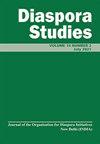文化生产的政治学
IF 0.5
Q4 DEMOGRAPHY
引用次数: 0
摘要
本文考察了散居在柏林和斯德哥尔摩的库尔德人的文化生产政治。该论文认为,库尔德文化行为者部署各种形式的文化生产,作为恢复库尔德集体遗产和文化身份的战略,并为库尔德事业实现知名度。此外,文化生产政治有助于促进对库尔德特殊议程的普遍团结,并挑战土耳其、伊朗和阿拉伯执政政府的压迫政策。最后,本文旨在解决库尔德难民的融合问题,并促进有凝聚力的散居社区克服流亡条件。基于民族志实地调查、对25名库尔德艺术家和知识分子的深入采访,以及参与者在柏林和斯德哥尔摩的观察,本文揭示了散居国外的库尔德文化生产如何为理解和解决复杂问题提供了一种替代方法。然而,与此同时,文化生产可能成为争论和政治动员的对象。本文章由计算机程序翻译,如有差异,请以英文原文为准。
The Politics of Cultural Production
This article examines the politics of cultural production in the Kurdish diaspora in Berlin and Stockholm. The paper argues that Kurdish cultural actors deploy various forms of cultural production as a strategy to restore Kurdish collective heritage and cultural identities and achieve visibility for the Kurdish cause. Furthermore, the politics of cultural production serves to promote universal solidarity for particularistic Kurdish agendas and challenges oppressive policies of ruling Turkish, Iranian and Arab governments. Finally, this article aims to address the integration of Kurdish refugees and boost cohesive diasporic communities to overcome exilic conditions. Based on ethnographic fieldwork, in-depth interviews with twenty-five Kurdish artists and intellectuals, and participant observations in Berlin and Stockholm, the paper sheds light on how Kurdish cultural production in the diaspora offers an alternative approach to understanding and tackling complex matters. However, at the same time, cultural production can become an object of contention and political mobilisation.
求助全文
通过发布文献求助,成功后即可免费获取论文全文。
去求助
来源期刊

Diaspora Studies
DEMOGRAPHY-
CiteScore
1.40
自引率
10.00%
发文量
18
期刊介绍:
Diaspora Studies is the interdisciplinary journal of the Organisation for Diaspora Initiatives (ODI) and is dedicated to publishing academic research on traditional diasporas and international migrants from the perspective of international relations, economics, politics, identity and history. The journal focuses specifically on diasporas and migrants as resources for both home and host countries. The scope of the journal includes the role of diasporas and international migration as important drivers in international relations, in development, and within civil societies. The journal welcomes theoretical and empirical contributions on comparative diasporas and state engagement policies, and aims to further scholarship and debate on emerging global networks and transnational identities. Diaspora Studies publishes: 1. Reviewed research papers 2. Book reviews 3. Conference reports 4. Documents on diaspora policies
 求助内容:
求助内容: 应助结果提醒方式:
应助结果提醒方式:


